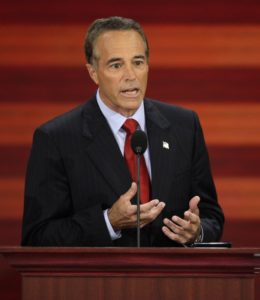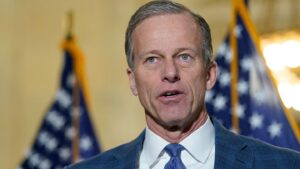
What To Know About Doug Collins, Trump’s Pick To Oversee Veterans Affairs
President-elect Donald Trump announced Thursday that he would appoint Doug Collins to lead the Veterans Affairs Department in his new administration. Here are five things to know about the former Republican congressman from Georgia who would lead the agency tasked with providing health care to former members of the U.S. armed forces: Collins is a Baptist minister who has served in the Navy and Air Force Reserve Collins, 58, holds a master’s degree in divinity from New Orleans Baptist Theological Seminary and pastored a church for 11 years. He served as a U.S. Navy chaplain for two years in the late 1980s. After the Sept. 11 attacks, he joined the U.S. Air Force Reserve as a chaplain. Collins deployed to Balad Air Force Base in Iraq for five months in 2008. He remains a colonel in the Air Force Reserve. Collins became a lawyer well into adulthood. Collins’ political career was shaped representing one of Georgia’s most conservative regions Collins was elected to the Georgia state House in 2007 and served three two-year terms. He was a floor leader for Gov. Nathan Deal, a fellow northeast Georgian, for one of those terms, helping to broker a budget cut that kept Georgia’s lottery-funded HOPE Scholarship program going at a time when leaders feared it would go bankrupt and not be able to pay promised college tuition for all beneficiaries. Collins won a seat in Congress in 2012 representing northeast Georgia’s 9th Congressional District, one of the most Republican districts in the country. The former incumbent, Tom Graves, was drawn into a new northwest Georgia district when the state added a 14th congressional seat because of population growth. Despite his right-wing positions, Collins faced serious primary challenges in 2016 from other Republicans who claimed he wasn’t conservative enough. While in Congress, Collins rose to vice chair of the House Republican Conference, the fifth-highest post in GOP leadership. Collins rose to national notice defending Trump in the Mueller probe Collins acquired a national reputation while defending Trump as the ranking member of the House Judiciary Committee during the investigation by special counsel Robert Mueller into whether Russia improperly influenced Trump’s 2016 election victory. Collins wrote a book about Trump’s first impeachment over allegations that he improperly withheld military aid from Ukraine in order to push Ukraine into announcing an investigation into Joe Biden, who went on to beat Trump in 2020. That book, “The Clock and the Calendar,” argued that Democrats were impeaching Trump to get revenge for him beating Hillary Clinton in 2016 and to prevent him from being reelected in 2020. “From the very moment that the majority party in this House won, the inevitability that we would be here today was only a matter of what date they would schedule it. Nothing else,” Collins said on the House floor in 2019 when representatives were debating before voting to impeach Trump. Trump wanted Collins appointed to the U.S. Senate Trump was displeased when Collins was not appointed to the U.S. Senate in 2019 when incumbent Republican Johnny Isakson stepped down because of health problems. Republican Georgia Gov. Brian Kemp instead decided to appoint Kelly Loeffler, but not before a frantic last-minute push by anti-abortion groups and people close to Trump to undermine Loeffler’s appointment. Collins ran for Senate anyway, finishing third in an all-party special election in November 2020 in which he was



































